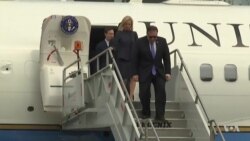U.S. Secretary of State Mike Pompeo says he "respectfully reinforced" the U.S. position on border security in each of his meetings with Mexican leaders during a visit to Mexico City to meet with the country's president and president-elect.
Mexican officials urged U.S. officials to reunite migrant families with children separated from their parents who crossed the border illegally.
Pompeo said after the talks that the U.S. "is committed to making measurable progress that ensures security on both sides of the border." One of U.S. President Donald Trump's campaign promises was to build a wall on the U.S. border with Mexico, to stem the flow of illegal immigrants. Trump promised, at the time, to make Mexico pay for the wall.
WATCH: Mexico Calls on Pompeo to Reunite Migrant Children with Their Parents
Pompeo said he and the rest of the U.S. delegation, which included presidential son-in-law Jared Kushner and Homeland Security Secretary Kirstjen Nielsen, also discussed trade with the Mexican officials. Pompeo said it is important that the U.S. and Mexico have a "strong, fair, and reciprocal trading relationship" that will require an "updated" North American Free Trade Agreement.
Mexican Foreign Secretary Luis Videgaray Caso said outgoing President Enrique Pena Nieto vowed to work with his successor Andres Manuel Lopez Obrador to present a "unified front" for Mexico as it transitions from one administration to the next on December 1.
Videgaray said Mexican officials expressed concern over the recent U.S. policy of separating children from their parents when apprehended at the U.S. border. They asked the U.S. delegates to give "their best efforts" to reunited children with their families as soon as possible.
The Trump Administration's effort to mend frayed relations and re-set bilateral ties between two neighboring countries took place just days after leftist Lopez Obrador won a landslide election to a six-year team. Also attending the talks was Lopez Obrador's proposed foreign secretary, Marcelo Ebrard Casaubon.
Casaubon is expected to lead Lopez Obrador's transition team until the December 1 presidential inauguration.
Protestors were holding signs outside Obrador's campaign office, objecting to U.S. immigration policy.
Strained relations
The high-profile meetings come amid strained relations between the two neighboring countries over illegal migration, border security, and trade negotiations.
To curb the influx of migrants — mostly from Central America — the two countries are said to be discussing a proposed "safe third country" agreement that could significantly reduce the flow of asylum seekers who journey through Mexico and cross illegally into the U.S.
A "safe third country" deal between Mexico and the U.S. would require asylum seekers from Central America to apply for protection in Mexico rather than at the U.S. border.
'Important, complex' issues
A senior U.S. official said to secure the border and address issues facing vulnerable communities, the two nations are in discussion about "two or three things" that would be announced in coming weeks.
The official said there are "push and pull factors" that the U.S. administration is working with Congress and first ladies from El Salvador, Guatemala, and Honduras. Known as the Northern Triangle, violence and rampant crime in those three countries have driven asylum seekers to the United States.
In a statement, the Department of Homeland Security said migrant flows are a shared responsibility among nations in Latin America, and Washington is working with regional governments to "find options for these individuals to remain within or closer to their countries of origin."
Critics warned such an agreement could put migrants fleeing violence in further danger.
Due process a priority
American Immigration Council Policy Director Royce Murray told VOA Friday any such deal must ensure that Mexico can process "a high volume of asylum seekers …without compromising due process."
"More importantly, we would need to assess whether Mexico can provide meaningful protections to asylum seekers," Murray added. "While there are many issues on the table between the U.S. and Mexico, refugees cannot become a mere chit whose safety and security can be negotiated away."
"The notion that Mexico is in any way safe for Central American asylum-seekers is preposterous," Simon Sandoval-Moshenberg of the advocacy group Legal Aid Justice Center told VOA on Thursday.
"I have had countless Central American clients, mostly women, tell me that the treatment they received in Mexico — whether by the cartels, or the government, or both — was nearly as bad as the violence they were fleeing in their home countries," he added.
Mexico officials had said the best way to tackle issues related to illegal migration and border security is to "spur development in Mexico."







